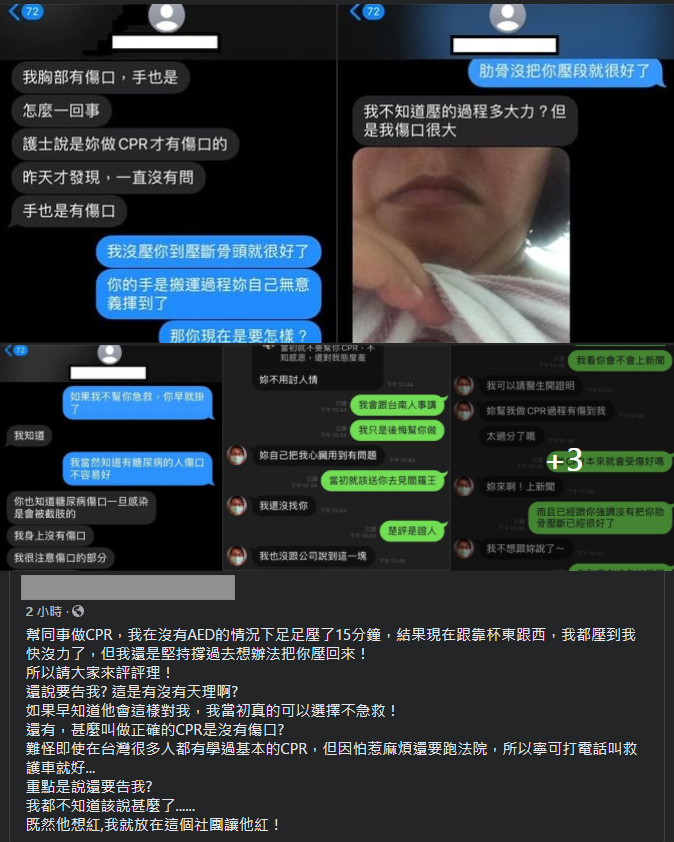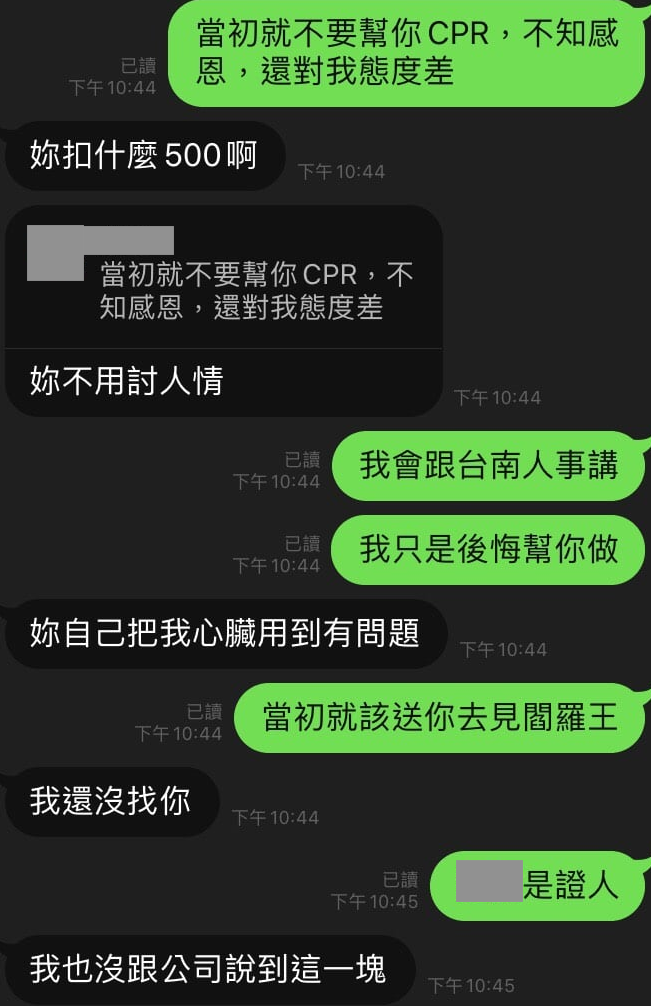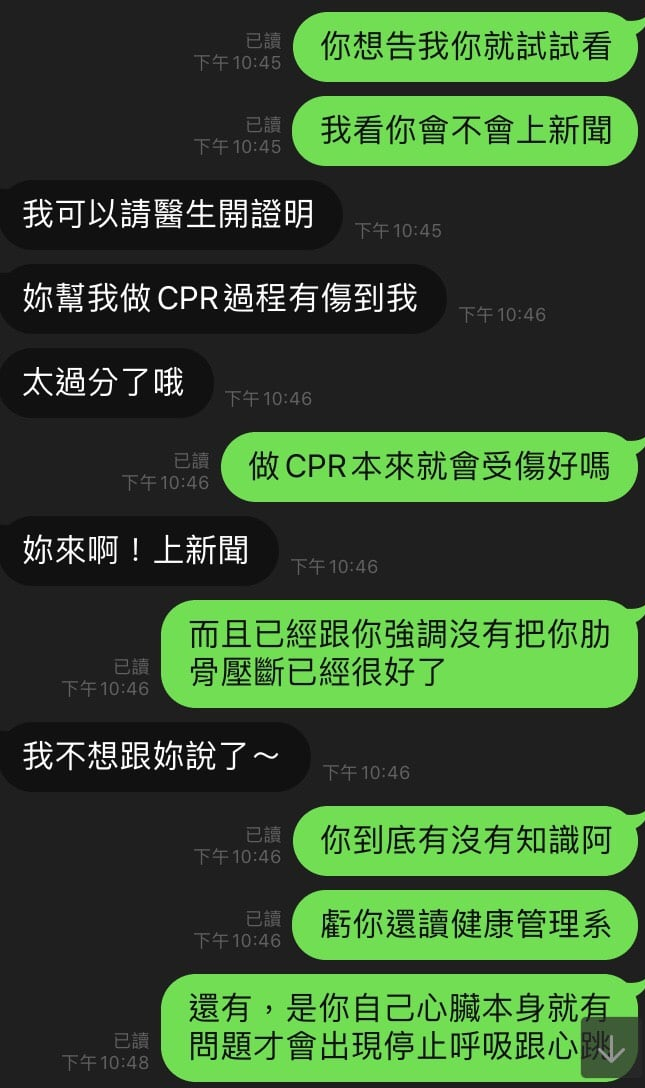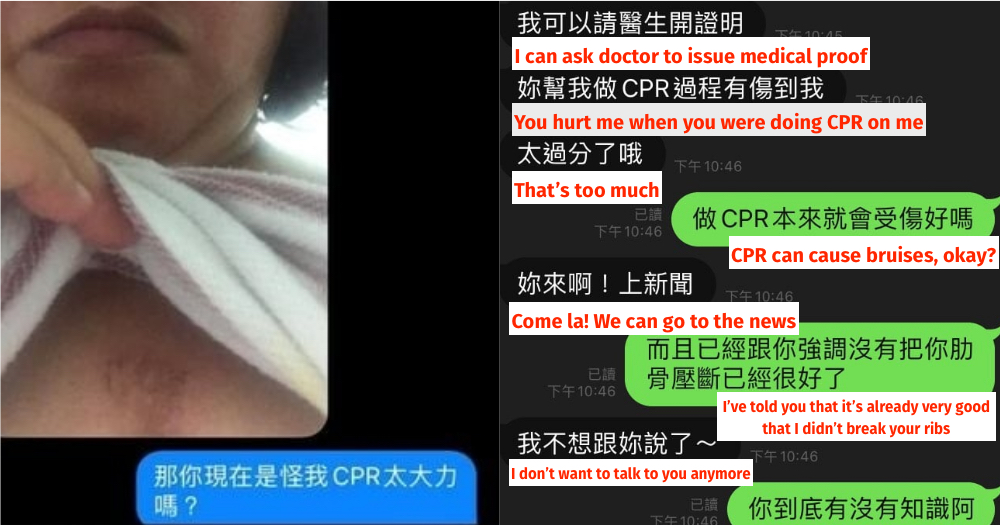A woman is blaming another woman in Taiwan after sustaining bruises on her chest -- after receiving emergency cardiopulmonary resuscitation (CPR) that resuscitated her.
The Taiwanese woman in Kaohsiung being blamed had successfully performed CPR on a former colleague.
The lifesaver, a woman surnamed Chu, told ET Today that her colleague, who has already quit her job due to health issues, even threatened to sue her for the injuries sustained during CPR.
The incident happened in September 2020.
Back then, Chu's colleague felt unwell and started having convulsions.
She stopped breathing
About two minutes into the ambulance ride to the hospital, the colleague's breathing suddenly ceased, and her heart stopped beating.
That's when Chu performed CPR on her.
Chu is not untrained.
She holds an emergency medical technician certification and it would have taken at least 20 minutes more to reach the hospital.
The CPR procedure lasted for about 15 minutes until her colleague regained consciousness.
In a Facebook post on Nov. 24, Chu wrote:
"I helped my colleague do CPR for 15 minutes as there was no automated external defilbrillator (AED)... I was feeling weak after doing chest compression for so long but I persisted because I want to save her!"
Chu also told ET Today that she was exhausted by the end of the session, and was drenched in sweat.
Had bruises on her chest
After her colleague recovered a month later, she questioned Chu about the bruises on her chest in a series of text messages.

According to Chu, the colleague accused her of doing CPR wrongly, which resulted in bruises and damages to her heart.
In one of their exchanges, Chu said, "If I had known that you'll be so ungrateful and rude, I wouldn't do CPR on you".
The colleague replied, saying, "You don't make that a favour I owe you."

The colleague also said that she can ask a doctor to provide medical proof about the bruises that Chu caused and said Chu is "too much".

Feeling exasperated, Chu posted all the screenshots in a Facebook group and lamented about what happened.
Woman's uncle apologised
Chu later updated that the colleague's uncle, who took care of her since young, reached out to her and apologised for her action, EBC reported.
The colleague, who has been hoping for a child, finally got pregnant from in-vitro fertilization so she was worried that she would lose the child, the uncle explained.
The uncle added that she has had problems getting along with her family recently and he got to know about this incident through her husband.

Feels indignant and hurt
EBC reported that Chu feels that the colleague should be responsible for her own action.
Chu said that she was hurt by the colleague's snide remarks such as, "So what you have a licence? You are still not a medical professional".
After Chu posted about this incident, many netizens took her side, saying that bruises and broken ribs can be expected from CPR.
Chu told ET Today that it baffles her why the colleague would blame her:
"She has type 1 diabetes and had to do in-vitro fertilisation to get pregnant. She's really weird, if her heart stops beating, I'll have to do chest compression so that the baby can live too, isn't it?"
No legal liability
In Taiwan, those who perform first aid or use emergency rescue equipment to save someone from immediate life-threatening danger are exempted from legal liability.
In Singapore, so long as CPR is applied with proper techniques, there should not be any liability even if the casualty were to sustain injuries that are known complications of CPR or chest compression, such as rib fractures, according to Singapore Heart Foundation.
CPR can significantly increase the chance of survival in the event when one encounters cardiac arrest.
Apart from encouraging bystanders to provide CPR when possible, AEDs are also more prevalent in the community these days in both Taiwan and Singapore to improve out-of-hospital sudden cardiac arrest survival rate.
Top image via Facebook post by Chu
If you like what you read, follow us on Facebook, Instagram, Twitter and Telegram to get the latest updates.
